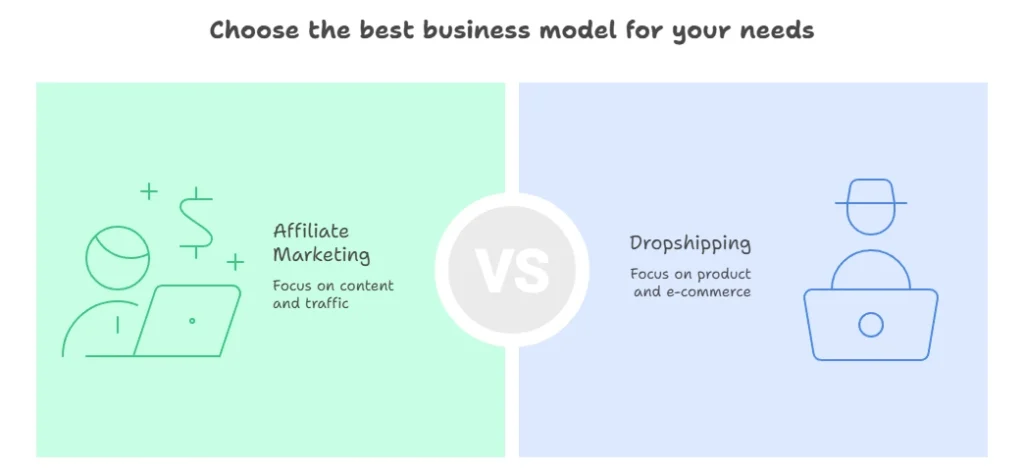 ATTENTION: Want to Learn Affiliate Marketing from Successful Affiliates?
Join this FREE community where successful marketers share their secrets!
Learn directly from highly successful affiliate marketers
Access free, actionable training content regularly
Connect with an active community of over 5,000 members
Network with multiple six-figure earning affiliates
Get your questions answered by real experts
JOIN FREE NOW!
ATTENTION: Want to Learn Affiliate Marketing from Successful Affiliates?
Join this FREE community where successful marketers share their secrets!
Learn directly from highly successful affiliate marketers
Access free, actionable training content regularly
Connect with an active community of over 5,000 members
Network with multiple six-figure earning affiliates
Get your questions answered by real experts
JOIN FREE NOW!
How to Choose the Right Model for Your Online Business
Starting an online business can be an exciting journey, but it comes with challenges. One key decision you’ll face is selecting the right business model. Affiliate Marketing Vs Dropshipping are two popular options, and each has its strengths and weaknesses. Understanding these models is essential to make the best choice for your goals.
What is Affiliate Marketing?
Affiliate marketing involves promoting products or services from other companies. You earn a commission whenever someone makes a purchase through your unique affiliate link. This model is attractive because you don’t need to handle inventory or customer service. Here are some significant benefits:
- Low Startup Costs: You don’t need to purchase products upfront, allowing you to start without significant investment.
- No Inventory Management: Since you are promoting other brands, there’s no need to deal with stock or shipping logistics.
- Flexibility: You can work from anywhere and choose the products you want to promote.
- Diverse Options: Affiliates can choose from a variety of products across different niches.
For a deeper dive into affiliate marketing, check out Shopify’s resource on affiliate marketing.
What is Dropshipping?
Dropshipping, on the other hand, is a model where you sell products directly to consumers without holding any inventory. When a customer places an order, the product is shipped directly from the supplier. Here are some advantages of dropshipping:
- Wide Product Range: You can offer various products without worrying about storage space.
- Lower Financial Risk: You only purchase the product after a sale is made, minimizing risk.
- Quick Business Setup: You can create an online store relatively quickly, giving you the chance to start earning sooner.
- Control Over Inventory: You have the option to choose what products to sell.
- Brand Ownership: You build your own brand with a custom storefront.
- Increased Complexity: Managing customer service and product sourcing can be challenging.
To learn more about dropshipping, explore Oberlo’s guide on dropshipping.
Key Differences Between Affiliate Marketing and Dropshipping
| Feature | Affiliate Marketing | Dropshipping |
|---|---|---|
| Inventory Management | No | No |
| Commission Structure | Earn a percentage of sales | Set your own prices |
| Customer Relationship | No direct interaction | Build stronger customer ties |
| Control over Branding | Limited | More control |
Which Model Suits You Best?
Choosing between affiliate marketing and dropshipping depends on several factors, including your skills, resources, and interests. Here are some questions to consider:
- What is your budget? Analyze how much you can invest upfront. Affiliate marketing usually requires less capital.
- Do you enjoy selling products? If you prefer promoting and advertising, affiliate marketing may be a better fit.
- What is your long-term vision? Consider how you envision your business evolving. Dropshipping can help you build a brand.
Additional Resources
To explore affiliate marketing, consider visiting Shopify’s learning resources. For dropshipping insights, check out Oberlo’s blog, which offers practical guidance on setting up your dropshipping business. Ultimately, the decision between Affiliate Marketing Vs Dropshipping will require consideration of your interests, goals, and resources. Each model has unique dynamics, and understanding these aspects will empower you to create a successful online business. The right choice can lead to a profitable and fulfilling entrepreneurial journey.
When considering ways to earn money online, many people find themselves weighing the pros and cons of two popular business models: Affiliate Marketing Vs Dropshipping. Both offer unique opportunities, but they also come with their own set of challenges. Understanding the key differences and similarities can help you make an informed decision about which path may suit you best.
Comparing Key Differences
To help illustrate the distinctions between affiliate marketing and dropshipping, consider the following table:
| Feature | Affiliate Marketing | Dropshipping |
|---|---|---|
| Startup Costs | Low | Moderate |
| Profit Margins | Variable, usually lower commissions | Higher, depending on product pricing |
| Inventory Management | None | Requires attention to stock levels |
| Customer Relationship | Limited, often influenced by the product owner | Direct relationship, as the seller |
| Marketing Focus | Content creation and traffic generation | Product listings and e-commerce management |
Similarities to Consider
Despite the differences, affiliate marketing and dropshipping share several qualities:
- Both Utilize Online Platforms: Both models rely heavily on internet marketing and e-commerce platforms.
- Work from Anywhere: You can manage both from the comfort of your home or anywhere with an internet connection.
- Scalability: Each business model can grow exponentially with the right strategies in place.
Choosing Your Path
Your choice between affiliate marketing and dropshipping largely depends on your skills and interests. If you enjoy creating content and have a knack for marketing, affiliate marketing might be more appealing. On the other hand, if you want to build a brand and manage an online store, dropshipping could be the better option. Consider where your strengths lie and what excites you more about doing business online.
Additionally, both models require some level of marketing knowledge. A resourceful website like Digital Marketer can provide valuable insights into effective online strategies. Affiliate Marketing Vs Dropshipping each offer unique benefits and challenges. The decision ultimately rests on what aligns with your goals and resources. Understanding these differences and similarities will empower you to make the right choice for your online business journey.
The Pros and Cons of Affiliate Marketing for Beginners
Affiliate marketing has become a popular choice for many beginners looking to make money online. It involves promoting products or services offered by others and earning a commission for each sale made through your referral. While affiliate marketing can be rewarding, it also comes with its own set of challenges. Here, we’ll explore the pros and cons of affiliate marketing for beginners.
Advantages of Affiliate Marketing
Low Startup Costs
One of the biggest draws of affiliate marketing is that it requires minimal upfront investment. You don’t need to create or own products, handle inventory, or manage shipping. Usually, all it takes is a website or a social media platform to get started.
Flexibility and Freedom
Affiliate marketing allows you to work from anywhere at any time. Whether you choose to write blog posts, create videos, or utilize social media, you have the freedom to choose how to promote your affiliate links. This flexibility is attractive to many, especially to those who wish to work from home or enjoy a digital nomad lifestyle.
Diverse Income Streams
By partnering with multiple affiliate programs, you can diversify your income sources. This reduces risk because if one program doesn’t perform well, you still have others that might. For instance, platforms like Amazon Associates and ClickBank offer a plethora of products to promote.
Potential for Passive Income
Once you generate traffic and establish your affiliate links, it’s possible to earn passive income. A well-performing blog post or video can continue to attract viewers and generate sales long after it’s been posted.
Challenges of Affiliate Marketing
Learning Curve
While starting in affiliate marketing is relatively easy, mastering it isn’t. Beginners often face a steep learning curve as they navigate SEO, audience targeting, and marketing strategies. It may take time to learn what works and what doesn’t.
Dependence on Other Companies
Your income as an affiliate marketer is largely dependent on the company whose products you are promoting. If they change their commission structure or discontinue a product, your revenue could drastically decrease. This dependency can create challenges and risks, making it crucial for you to regularly evaluate the affiliate programs you are using.
Competition
The internet is saturated with affiliate marketers. Competing for the same audience can be tough, especially for beginners. Understanding how to differentiate your content and effectively drive traffic is essential for success. Tools like SEMrush can be invaluable in optimizing your strategy.
Building Trust Takes Time
To be successful in affiliate marketing, you need to build trust with your audience. This can take time, especially if you are new to the space. Authenticity and transparency in your recommendations are key to fostering relationships and gaining credibility.
Summary of Pros and Cons
| Feature | Affiliate Marketing | Dropshipping |
|---|---|---|
| Inventory Management | No | No |
| Commission Structure | Earn a percentage of sales | Set your own prices |
| Customer Relationship | No direct interaction | Build stronger customer ties |
| Control over Branding | Limited | More control |
| Flexibility and Freedom | High – work from anywhere and choose products | Moderate – flexibility with some operational duties |
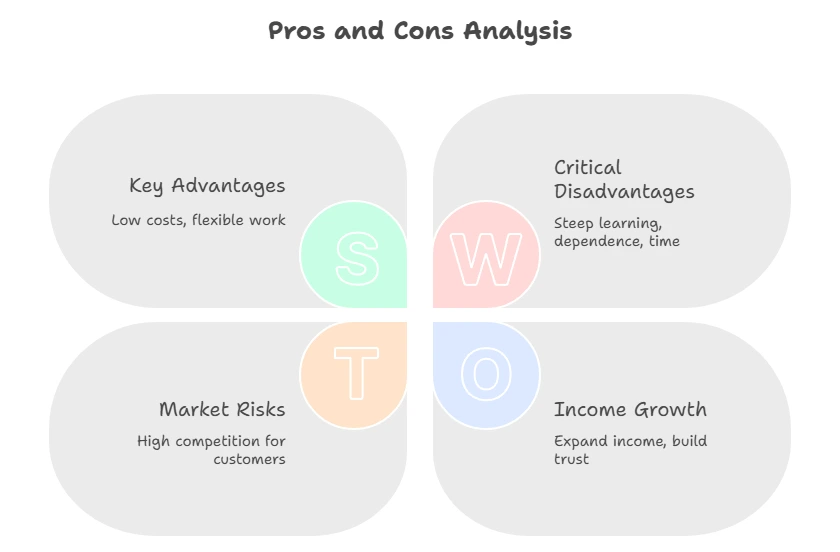
Affiliate marketing can be an excellent avenue for beginners seeking to monetize their online presence. While it has its advantages, being aware of the potential challenges can prepare you for a successful experience. If you’re interested in exploring this industry further, platforms like Ahrefs can help you understand SEO and content strategies that improve your chances of success. Remember, the journey to becoming a successful affiliate marketer requires patience, continuous learning, and dedication, but for those willing to put in the effort, the rewards can be substantial.
Success Stories: Entrepreneurs Thriving in Affiliate Marketing and Dropshipping
Many entrepreneurs today are finding success through two popular methods: affiliate marketing and dropshipping. Each path offers unique opportunities and challenges, making it crucial for aspiring business owners to understand how they can thrive in either field. Let’s explore some inspiring stories from real entrepreneurs who have made their mark in these industries.
Affiliate Marketing Success Stories
Affiliate marketing is a performance-based marketing strategy where individuals earn commissions by promoting other people’s products. Here are a few notable examples:
 Pat Flynn: Pat is a well-known figure in the affiliate marketing community. He started his online journey with a site called Smart Passive Income. Today, he earns a six-figure income through affiliate marketing by promoting products he believes in, especially within the online business and education niches. His transparent approach has built a loyal audience who trusts his recommendations. You can check out his journey on Smart Passive Income.
Pat Flynn: Pat is a well-known figure in the affiliate marketing community. He started his online journey with a site called Smart Passive Income. Today, he earns a six-figure income through affiliate marketing by promoting products he believes in, especially within the online business and education niches. His transparent approach has built a loyal audience who trusts his recommendations. You can check out his journey on Smart Passive Income.
 Michelle Schroeder-Gardner: Michelle runs a personal finance blog called Making Sense of Cents. She transitioned from a traditional job to affiliate marketing after realizing she could earn significantly more by promoting financial products. With consistent content creation and effective marketing strategies, Michelle has made over $100,000 a month through affiliate marketing. Her story is a testament to the power of passion-driven content. Learn more about her insights at Making Sense of Cents.
Michelle Schroeder-Gardner: Michelle runs a personal finance blog called Making Sense of Cents. She transitioned from a traditional job to affiliate marketing after realizing she could earn significantly more by promoting financial products. With consistent content creation and effective marketing strategies, Michelle has made over $100,000 a month through affiliate marketing. Her story is a testament to the power of passion-driven content. Learn more about her insights at Making Sense of Cents.
Dropshipping Success Stories
Dropshipping allows entrepreneurs to sell products without holding inventory. When a product is sold, the merchant purchases the item from a third party and has it shipped directly to the customer. Here are some entrepreneurs who have found great success in dropshipping:
- Ashley and Zane from The Trendy Shop: This couple started their dropshipping business by identifying trending products on social media. Within six months, they scaled their business to generate over $200,000 in sales. By utilizing social media advertising and a keen eye for trends, they have made dropshipping a lucrative business model. More about them can be found on The Trendy Shop.
- Oberlo Founders: Oberlo has become a leading dropshipping platform that helps many entrepreneurs start their online stores. The founders began their journey by creating a dropshipping business that quickly gained traction. They focused on providing education and resources that have empowered thousands of others to succeed in dropshipping. To see their resources, visit Oberlo.
Comparing Affiliate Marketing and Dropshipping
Understanding the differences between affiliate marketing and dropshipping can help you identify which path may be the best fit for you. Below is a brief comparison:
| Feature | Affiliate Marketing | Dropshipping |
|---|---|---|
| Initial Investment | Low – mainly marketing expenses | Higher – costs for setting up an e-commerce store |
| Profit Margins | Typically low – 5% to 30% | Varied – can be 10% to 50% depending on the product |
| Product Ownership | No product ownership | No product ownership |
| Control Over Brand | Limited control – rely on the product vendor | More control – full branding and customer experience |
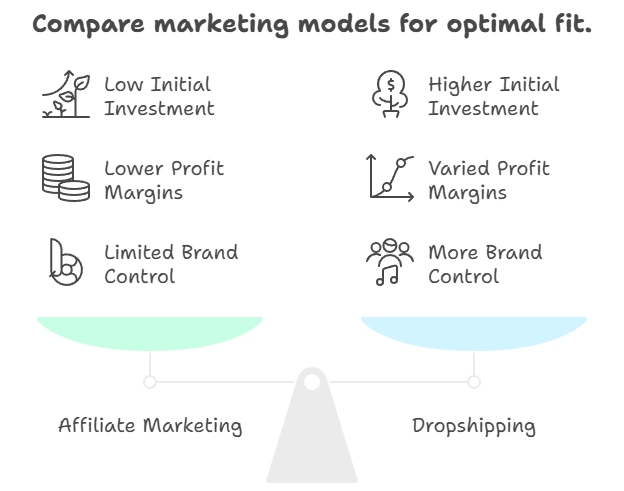
Both affiliate marketing and dropshipping have multiple success stories that highlight the potential within each model. Entrepreneurs like Pat Flynn and Michelle Schroeder-Gardner have made significant strides in affiliate marketing, while dropshipping pioneers like Ashley and Zane from The Trendy Shop have also carved out their niche.
Ultimately, success in either area revolves around understanding your target audience, choosing the right products, and actively marketing your offerings. With dedication and the right strategies, you too can achieve your entrepreneurial dreams in affiliate marketing or dropshipping. If you want to explore these business models further, consider checking resources like Shopify for Dropshipping and Ahrefs for Affiliate Marketing for detailed guides and insights.
Essential Tools and Resources for Affiliate Marketers and Dropshippers
When diving into the worlds of affiliate marketing and dropshipping, having the right tools and resources can significantly improve your success. Both business models are popular for entrepreneurs looking to make money online without dealing with physical inventory. However, they do have different needs when it comes to tools and resources. Below, we’ll look at essential tools for both affiliate marketers and dropshippers, helping you understand what can work best for your strategies.
Essential Tools for Affiliate Marketers
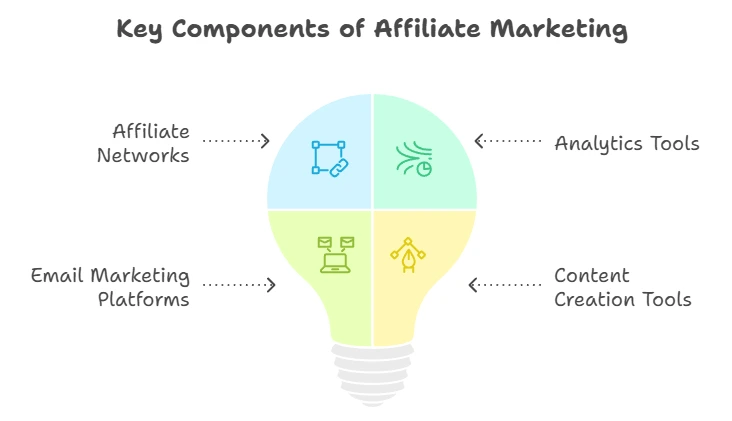
Affiliate marketers need tools that help them track performance, manage relationships, and optimize their websites. Here are some vital resources:
Affiliate Networks
- ShareASale: A popular affiliate network that connects marketers with various products and offers.
- ClickBank: Best known for digital product promotions, making it an excellent platform for many online entrepreneurs.
- Amazon Associates: One of the largest affiliate programs available, offering a plethora of products to promote.
Analytics Tools
- Google Analytics: Essential for tracking website traffic and understanding user behavior.
- SEMrush: Offers comprehensive analyses of competitive landscape and keyword performance.
Email Marketing Platforms
- Mailchimp: Excellent for creating and managing email campaigns to keep your audience engaged.
- ConvertKit: Designed specifically for creators, offering powerful segmentation and automation features.
Content Creation Tools
- Canva: A user-friendly graphic design tool essential for creating eye-catching promotional materials.
- WordStream: Helps create compelling ad copy to promote your affiliate links.
Essential Tools for Dropshippers
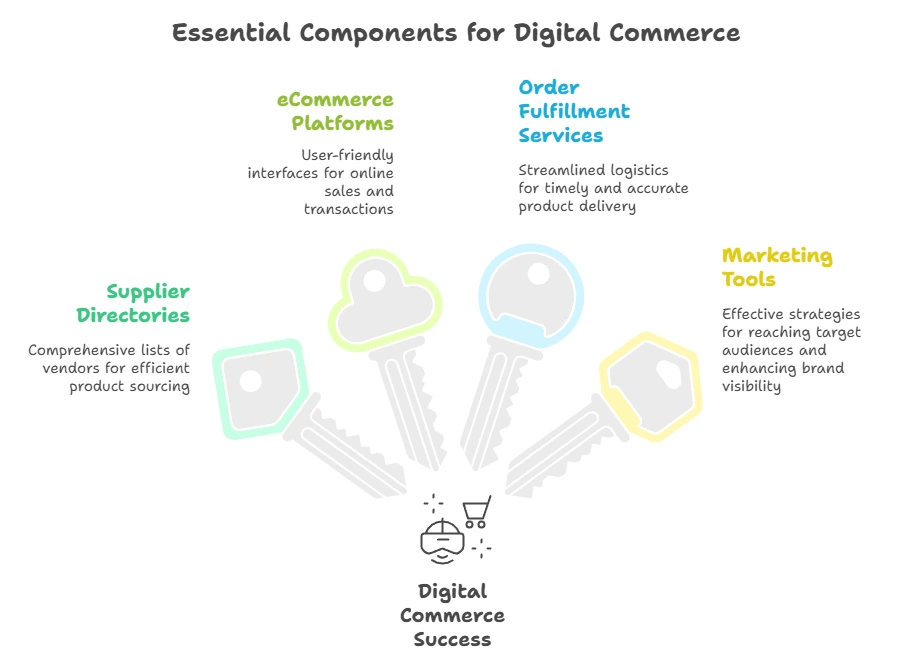
For dropshipping, the focus is more on managing supplier relationships, product sourcing, and fulfilling orders. Here are some necessary resources:
Supplier Directories
- AliExpress: A vast platform for finding suppliers who are willing to dropship.
- Doba: A comprehensive dropshipping platform that connects retailers with suppliers across various industries.
eCommerce Platforms
- Shopify: A leading eCommerce platform that simplifies setting up an online store.
- WooCommerce: An excellent option for WordPress users looking to establish a dropshipping store.
Order Fulfillment Services
- ShipBob: This service integrates with various platforms to handle storage, packing, and shipping of products.
- Fulfyld: Another strong fulfillment partner for dropshippers, offering various logistics services.
Marketing Tools
- Hootsuite: Helps schedule social media posts and track engagements.
- AdRoll: Great for retargeting ads to boost sales and drive traffic back to your store.
Comparative Table of Tools
| Category | Affiliate Marketing Tools | Dropshipping Tools |
|---|---|---|
| Networks/Directories | ShareASale, ClickBank | AliExpress, Doba |
| Analytics | Google Analytics, SEMrush | N/A |
| Email Marketing | Mailchimp, ConvertKit | N/A |
| Content Creation | Canva, WordStream | N/A |
| eCommerce Platforms | N/A | Shopify, WooCommerce |
| Order Fulfillment | N/A | ShipBob, Fulfyld |
| Marketing Tools | N/A | Hootsuite, AdRoll |
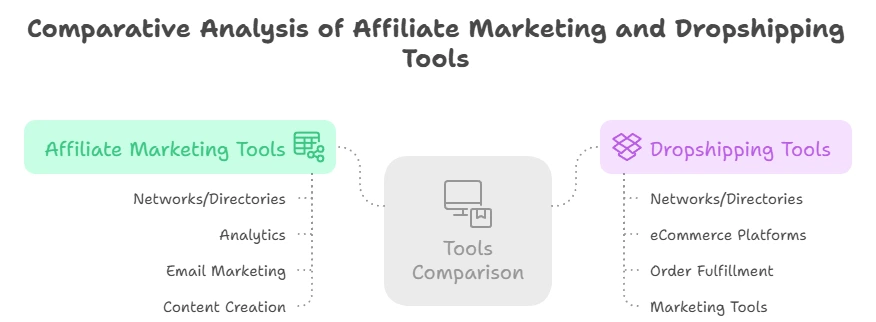
Ultimately, the tools and resources you choose will depend on your specific needs and goals within each business model. Both affiliate marketers and dropshippers can benefit from integrating effective tools to maximize efficiency and profitability. By leveraging the right resources, you can enhance your marketing strategies and streamline operations, setting yourself up for success in the competitive online marketplace.
Conclusion
When considering Affiliate Marketing Vs Dropshipping, it’s clear both models offer unique advantages and challenges. Each pathway provides an opportunity for you to embark on your online business journey, but the right choice depends on your skills, interests, and long-term goals.
If you prefer content creation and building a loyal audience, affiliate marketing might be the perfect fit for you. It allows you to earn commissions by promoting products you believe in, with less risk and upfront investment. However, it requires a keen understanding of SEO and marketing strategies to maximize your revenue.
On the other hand, dropshipping positions you to manage an online store without carrying inventory, which can be appealing if you want to sell a variety of products. This model offers more control over branding and product selection, but it often involves more complex logistics, including supplier relationships and order fulfillment.
The success stories of thriving entrepreneurs in both fields illustrate that with dedication and the right tools, you can succeed in either model. Utilizing essential resources like marketing platforms, analytics tools, and e-commerce websites is crucial for boosting your business.
Ultimately, your decision should align with your passion and the level of commitment you’re ready to invest. Whether you lean towards affiliate marketing or dropshipping, the key is to continually learn and adapt to the evolving online landscape. By embracing either model thoughtfully, you can create an online business that not only meets your financial goals but also fulfills your entrepreneurial spirit.

